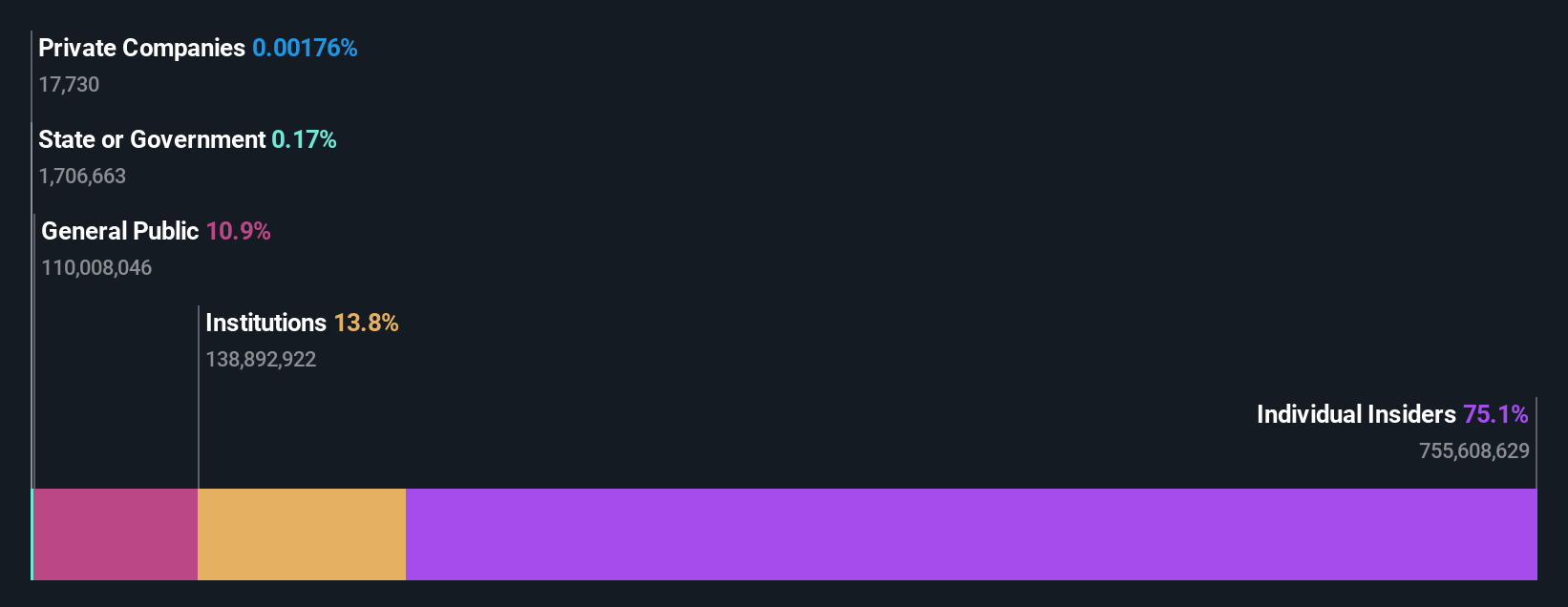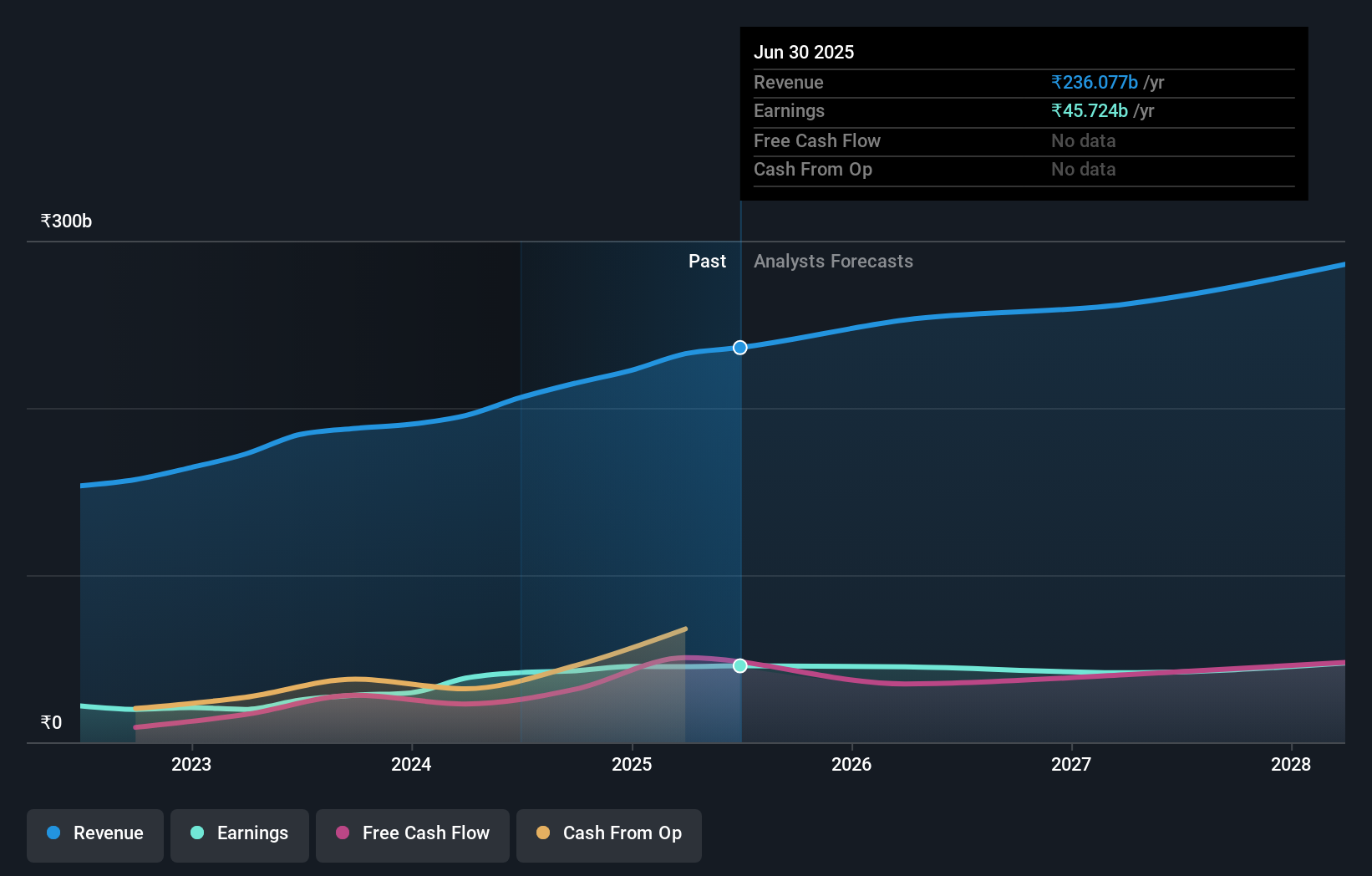Insiders are the top stockholders in Zydus Lifesciences Limited (NSE:ZYDUSLIFE), and the recent 4.2% drop might have disappointed them
Key Insights
- Zydus Lifesciences' significant insider ownership suggests inherent interests in company's expansion
- The largest shareholder of the company is Pankaj Patel with a 75% stake
- Institutional ownership in Zydus Lifesciences is 14%
To get a sense of who is truly in control of Zydus Lifesciences Limited (NSE:ZYDUSLIFE), it is important to understand the ownership structure of the business. And the group that holds the biggest piece of the pie are individual insiders with 75% ownership. That is, the group stands to benefit the most if the stock rises (or lose the most if there is a downturn).
As a result, insiders as a group endured the highest losses after market cap fell by ₹44b.
In the chart below, we zoom in on the different ownership groups of Zydus Lifesciences.
View our latest analysis for Zydus Lifesciences

What Does The Institutional Ownership Tell Us About Zydus Lifesciences?
Institutional investors commonly compare their own returns to the returns of a commonly followed index. So they generally do consider buying larger companies that are included in the relevant benchmark index.
Zydus Lifesciences already has institutions on the share registry. Indeed, they own a respectable stake in the company. This implies the analysts working for those institutions have looked at the stock and they like it. But just like anyone else, they could be wrong. When multiple institutions own a stock, there's always a risk that they are in a 'crowded trade'. When such a trade goes wrong, multiple parties may compete to sell stock fast. This risk is higher in a company without a history of growth. You can see Zydus Lifesciences' historic earnings and revenue below, but keep in mind there's always more to the story.

Zydus Lifesciences is not owned by hedge funds. Looking at our data, we can see that the largest shareholder is Pankaj Patel with 75% of shares outstanding. With such a huge stake in the ownership, we infer that they have significant control of the future of the company. Meanwhile, the second and third largest shareholders, hold 4.4% and 1.8%, of the shares outstanding, respectively.
Researching institutional ownership is a good way to gauge and filter a stock's expected performance. The same can be achieved by studying analyst sentiments. There are a reasonable number of analysts covering the stock, so it might be useful to find out their aggregate view on the future.
Insider Ownership Of Zydus Lifesciences
While the precise definition of an insider can be subjective, almost everyone considers board members to be insiders. Company management run the business, but the CEO will answer to the board, even if he or she is a member of it.
Most consider insider ownership a positive because it can indicate the board is well aligned with other shareholders. However, on some occasions too much power is concentrated within this group.
Our most recent data indicates that insiders own the majority of Zydus Lifesciences Limited. This means they can collectively make decisions for the company. Insiders own ₹750b worth of shares in the ₹998b company. That's extraordinary! It is good to see this level of investment. You can check here to see if those insiders have been selling any of their shares.
General Public Ownership
The general public, who are usually individual investors, hold a 11% stake in Zydus Lifesciences. This size of ownership, while considerable, may not be enough to change company policy if the decision is not in sync with other large shareholders.
Next Steps:
It's always worth thinking about the different groups who own shares in a company. But to understand Zydus Lifesciences better, we need to consider many other factors. Case in point: We've spotted 2 warning signs for Zydus Lifesciences you should be aware of, and 1 of them can't be ignored.
If you would prefer discover what analysts are predicting in terms of future growth, do not miss this free report on analyst forecasts.
NB: Figures in this article are calculated using data from the last twelve months, which refer to the 12-month period ending on the last date of the month the financial statement is dated. This may not be consistent with full year annual report figures.
Valuation is complex, but we're here to simplify it.
Discover if Zydus Lifesciences might be undervalued or overvalued with our detailed analysis, featuring fair value estimates, potential risks, dividends, insider trades, and its financial condition.
Access Free AnalysisHave feedback on this article? Concerned about the content? Get in touch with us directly. Alternatively, email editorial-team (at) simplywallst.com.
This article by Simply Wall St is general in nature. We provide commentary based on historical data and analyst forecasts only using an unbiased methodology and our articles are not intended to be financial advice. It does not constitute a recommendation to buy or sell any stock, and does not take account of your objectives, or your financial situation. We aim to bring you long-term focused analysis driven by fundamental data. Note that our analysis may not factor in the latest price-sensitive company announcements or qualitative material. Simply Wall St has no position in any stocks mentioned.
About NSEI:ZYDUSLIFE
Zydus Lifesciences
Engages in the research, development, production, marketing, distribution, and sale of pharmaceutical products in India, the United States, and internationally.
Flawless balance sheet average dividend payer.
Market Insights
Community Narratives





